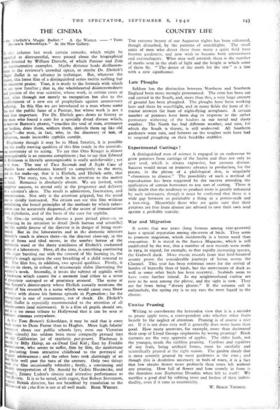THE CINEMA ,
...Br. Ehrlich's Magic Bullet." A the Warner. — " Tom Brown's Schooldays." At the New Gallery.
15 this column last week certain remarks, which might be regarded as disrespectful, were passed about the biographical s directed by William Dietetic, of which Pasteur and Zola are representative examples. Maybe distance lends disillusion- eat to the reviewer's crowded optics, or maybe Dr. Ehrlich's agic Bullet is an advance in technique. But, whatever the reason, this latest film of a distinguished series merits nothing but the sincerest praise. True, it is made to the formula with which we are now familiar ; that is, the wholehearted disinterestedness and passion of the true scientist, whose work, in certain cases at least, wins through not merely to recognition but also to the establishment of a new era of prophylaxis against unnecessary suffering. In this film we are introduced to a man whose name has not the public fame of a Pasteur, but whose work is not a *hit less important. For Dr. Ehrlich goes down to history as the man who found a cure for a specially dread disease which, to borrow Burton's phrase, "crucifies the soul of man, attenuates our bodies, dries them, withers them, shrivels them up like old apples "—the man, in fact, who, in the discovery of 606, of Saltarsan, made incurable syphilis curable.
Blasphemy though it may be to Muni fanatics, it is possible that the really moving qualities of this film reside in the astonish- ing anonymity of its arcing. To say that Otto Kruger is almost unrecognisable is an extreme compliment ; but to say that Edward . Robinson is literally unrecognisable is really unbelievable ; yet it is true. The star of Two Seconds and A Sight Case of Wunder here subordinates himself so completely to the story, and to his make-up, that it is Ehrlich, and Ehrlich only, that we see. The story, too, is stark in its attention to the matter hand. Romance is absolutely absent. We are invited, with complete success, to attend only at the pregnancy and delivery of a scientist's ideas. The result is admiration, fascination, and centration. Not only is the attention gripped, but the mind is vividly instructed. No citizen can see this film without imilating the broad principles of the methods by which tuber- culosis can be accurately diagnosed, of the secret of immunisation torn diphtheria, and of the basis of the cure for syphilis. The film—in setting and dresses a pure period piece—is so eratincing in its attention to detail (both human and scientific) that the subtle finesse of the director is in danger of being over- ed. But in the laboratories and in thz domestic interiors erle's touch is always there--in the discreet dose-up, in the is of ferns and tiled stoves, in the sombre horror of the htheria ward or the dusty untidiness of Ehrlich's enchanted Otto of a laboratory. Here, all the time, is something convincing e cigar burning out with the renewal of life burning in, the entist's cough against the easy breathing of a child restored to
e The film has, in addition, two special qualities. Firstly, it ▪ cut-in shots, in colour, of microscopic slides illustrating the
entist's work. Secondly, it treats the subject of syphilis with frankness which cannot for a moment lead either to a sense propriety outraged or of pruriency aroused. The scene at rail Speyer's dinner-party where Ehrlich casually mentions the %Nett of his research is a scene which would cause even Shaw revise with shame his famous episode in Pygmalion; for the rznosphere is one of reassurance, not of shock. Dr. Ehrlich's 3fagic Bullet is especially recommended to the attention of all 'masters (and mistresses). It is a film all pupils should see, it is no mean tribute to Hollywood that it can be seen at 'nary cinemas everywhere.
As for Tom Brown's Schooldays, it may be said that it owes ch more to Dean Farrar than to Hughes. More high falutin' myrot about our public schools (yes, even our Victorian hlic schools) has seldom been more compactly pressed into old Californian jar of synthetic pot-pourri. Flashman is Sed by Billy Halop, an ex-Dead End Kid ; East by Freddie lomew, who seems to suffer, film by film, the misfortune graduating from attractive childhood to the portrayal of ggish adolescence ; and the other boys reek alarmingly of an Side well past the turn of the century. Only two things e the film occasionally tolerable ; firstly, a convincing and ble interpretation of Dr. Arnold by Cedric Hardwicke, and
Jimmy Lydon's sincere and attractive performance as
Brown_ It is to be noted, with regret, that Robert Stevenson, anted British director, has not benefited by translation to the !'wood air ; the fi'm is not at all well made. Rasa. Waearr.


























 Previous page
Previous page